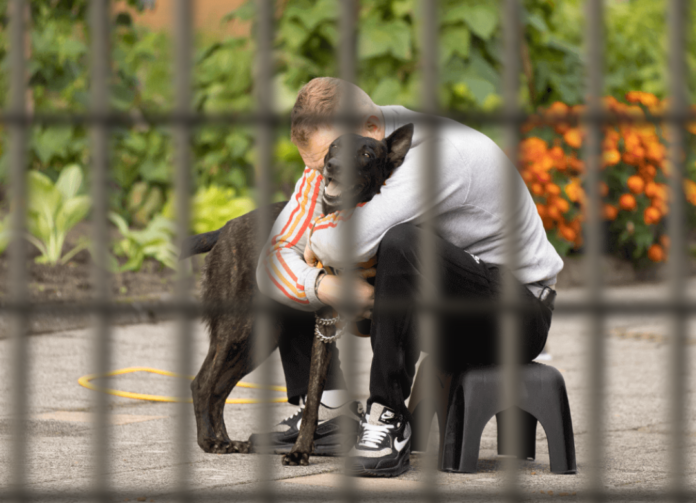They are both behind bars and have little contact with the outside world: shelter animals and detainees. At forensic clinic De Woenselse Poort foundation Dutch Cell Dogs brings these two groups together so they can learn from eachother
The Dutch Cell Dogs foundation is active in sixteen places in The Netherlands, one of which is the forensic clinic De Woenselse Poort in Eindhoven. Betty Buijtels is one of the founders and present at the training session. . “Shelter animals are locked up and these people have been removed from society temporarily. We want to give them new chances”, she says.
Selection process
The ICRU clinic decides which clients are elligible for the foundation’s training programme. The training programme with the shelter dogs goes on for weeks. In many cases the dog is so well trained that it can go to a new owner. Take Rocky. “A stray that spent a long time in the shelter”, Betty tells us.
Rocky was a skinny, timid dog with a fear of men. “What you see now is a dog that has grown through training. Rocky is lucky to have found a new owner who treats him responsibly. Kudos for the new owner.”
Energy
This is a win-win situation, as it’s not just the dogs who benefit. The inmates learn a lot too, for example Maarten* who trains Bobbie. “I am learning to be patient and manage my anger. Bobbie gives me positive energy. I have difficulty forging a connection of trust with a supervisor, but that’s easy with a dog”, he says as Bobbie sits beside him wagging its tail.
The dogs leave the inmates at the end of the training period. Ideally they are adopted, so they do not have to back to the shelter. This also goes for Bobbie, who has meanwhile been adopted by Math Driessen. Maarten had written a letter in search of a new owner for Bobbie and that was on Facebook. “That letter spoke to me. My dog had just died. I went to meet Bobbie and lined him very much”, Math says.
Math applauds the work done by the Dutch Cell Dogs foundation. “They are helping the dogs as well as the detainees”. Math also remarks that Maarten sees the parallels in the lives of dogs. At the shelter, dogs are locked up at four and do not come out until nine in the morning. Detainees will recognise the pattern”.
Self confidence
Lisa is another detainee happy to help train the dogs . “I used to be really insecure. Nova has given me more self confidence”, she says. Lisa has been a client in De Woenselse Poort since November and has been training with the dog foe some time. “Nova was grievously neglected and I notice I have been able to gain her confidence. I will be released soon and that it partly thanks to her. Working with the dog brings me more than regular therapy”.
NZeurse Matty Timmermans has been with De Woenselse Poort for forty-four years. He understands why Lisa benefits from the training. “This suits her”, he says. “A dog can be a mirror for a person. Some people’s minds are crowded and some dogs’ minds are too. Combine the two and the person sees what’s happening in the dog, but the person also really sees himself”.
*Clients’ names are made-up names
Image credit Dutch Cell Dogs foundation
Source: Studio040
Translated by Greta











